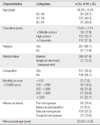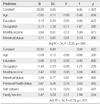Abstract
Purpose
The purpose of this study was to investigate expectations regarding aging by middle-aged women in the community, and identify factors contributing to their expectations about aging.
Methods
Participants in the survey for this study were 303 middle-aged women from community health centers and religious facilities in Seoul, Gyeonggi Province, and Chungcheongbuk Province. Data were collected from March 2 to April 17, 2012 using self-report structured questionnaires. The instruments were the Health Perceptions, Rosenberg Self-esteem Scale (RSES), Family APGAR, Expectations Regarding Aging (ERA-12). The data were analyzed using t-test, one-way ANOVA, Scheffe test, Pearson correlation coefficients and hierarchical multiple regression with IBM SPSS/WIN 20.0 program.
Figures and Tables
Table 2
Perceived Health Status, Self-esteem, Family Function and Expectations Regarding Aging of the Participants (N=303)

Table 3
Differences of Expectations Regarding Aging by General Characteristics of the Participants (N=303)

References
1. An JY, An K, O'Connor L, Wexler S. Life satisfaction, self-esteem, and perceived health status among elder Korean women: Focuson living arrangements. J Transcult Nurs. 2008. 19(2):151–160. http://dx.doi.org/10.1177/1043659607313070.
2. Angus J, Reeve P. Ageism: A threat to "aging well" in the 21st century. J Appl Gerontol. 2006. 25(2):137–152. http://dx.doi.org/10.1177/0733464805285745.
3. Bak HK. A study on leisure activities, leisure life satisfaction, perceived health status and depression in the elderly. Korean J Rehabil Nurs. 2009. 12(2):112–119.
4. Chiou CJ, Chang HY, Chen IP, Wang HH. Social support and caregiving circumstances as predictors of caregiver burden in Taiwan. Arch Gerontol Geriatr. 2009. 48(3):419–424. http://dx.doi.org/10.1016/j.archger.2008.04.001.
5. Choi J, Ha NS. Effects of perceived health status and fatigue on family health in middle aged women. J Korean Acad Public Health Nurs. 2009. 23(1):5–16.
6. Chong YS, Jo SA, An JS, Jeong YJ. Effect of family relations as a source of meaning of life and self-transcendence value on successful aging in Korean elders. Korean J Dev Psychol. 2012. 25(1):19–41.
7. Faul F, Erdfelder E, Lang AG, Buchner A. G*Power 3: A flexible statistical power analysis program for the social, behavioral, and biomedical sciences. Behav Res Methods. 2007. 39(2):175–191.
8. Han J. The roles of self and society in the relationship between physical health, self-perception of aging, and depressive symptoms in later life. 2011. Ohio, USA: The Ohio State University;Unpublished doctoral dissertation.
9. Hong SH, Kwak IS. The effects of attitude towards aging on successful aging: The differences between single and couple aged family. J Korean Home Econ Assoc. 2011. 49(4):77–91.
10. Jeong YJ, An JS. The effects of family relationships on successful aging of the elderly men. J Korean Gerontol Soc. 2010. 30(2):535–550.
11. Kim KH, Kim HS, Park KS. The effects of family function, self-esteem, and loneliness on subjective health status in middle-aged women. J Korean Acad Adult Nurs. 2005. 17(2):200–207.
12. Kim SA, Kim SY. The impacts of self-esteem and social support on mental health of the middle-age women. J Welf Aged. 2011. 52:109–130.
13. Kim SH. The association between expectations regarding aging and health-promoting behaviors among Korean older adults. J Korean Acad Nurs. 2007. 37(6):932–940.
14. Kim SH. Older people's expectations regarding ageing, health-promoting behaviour and health status. J Adv Nurs. 2009. 65(1):84–91. http://dx.doi.org/10.1111/j.1365-2648.2008.04841.x.
15. Kim SY. A study of the elderly image in Korean and Japanese television advertisements. Korean J Sociol. 2009. 43(5):133–169.
16. Lee KJ, Chang CJ, Yoo JH, Yi YJ. Factors effecting health promoting behaviors in middle-aged women. J Korean Acad Nurs. 2005. 35(3):494–502.
17. Lee MS. Chronic diseases, depressive symptoms and the effects of social networks in Korean elderly population. Health Soc Sci. 2010. 27:5–30.
18. Lee SS. A study on self-esteem and physical satisfaction of the elderly women. J Korean Gerontol Soc. 2009. 29(2):547–562.
19. Marquez DX, Bustamante EE, Blissmer BJ, Prohaska TR. Health promotion for successful aging. Am J Lifestyle Med. 2009. 3(1):12–19. http://dx.doi.org/10.1177/1559827608325200.
20. Park GJ. Factors influencing the meaning of life for middle-aged women. Korean J Women Health Nurs. 2002. 8(2):232–243.
21. Rosenberg M. Conceiving the self. 1979. New York, NY: Basic Books.
22. Sarkisian CA, Prohaska TR, Wong MD, Hirsch S, Mangione CM. The relationship between expectations for aging and physical activity among older adults. J Gen Intern Med. 2005. 20(10):911–915. http://dx.doi.org/10.1111/j.1525-1497.2005.0204.x.
23. Sarkisian CA, Steers WN, Hays RD, Mangione CM. Development of the 12-item expectations regarding aging survey. Gerontologist. 2005. 45(2):240–248.
24. Smilkstein G, Ashworth C, Montano D. Validity and reliability of the family APGAR as a test of family function. J Fam Pract. 1982. 15(2):303–311.
25. Song JE, Marks NF. Parent-adult child relationships and mental health among older parents: A longitudinal U.S. national study. J Korean Gerontol Soc. 2006. 26(3):581–599.
26. Speake DL, Cowart ME, Pellet K. Health perceptions and lifestyles of the elderly. Res Nurs Health. 1989. 12(2):93–100.
27. Statistics Korea. 2010 life tables for Korea. 2011a. Retrieved January 16, 2012. from http://kostat.go.kr/portal/korea/kor_nw/3/index.board?bmode=read&aSeq=252533.
28. Statistics Korea. Population projections for Korea: 2010-2060. 2011b. Retrieved January 16, 2012. from http://kostat.go.kr/portal/korea/kor_nw/2/1/index.board?bmode=read&aSeq=252623.
29. Wu ZQ, Sun L, Sun YH, Zhang XJ, Tao FB, Cui GH. Correlation between loneliness and social relationship among empty nest elderly in Anhui rural area, China. Aging Ment Health. 2010. 14(1):108–112. http://dx.doi.org/10.1080/13607860903228796.
30. Yoo JH, Chu SK, Ban KO. The relationship between the psychosocial characteristics, family function, and activities of daily living in the elderly females. J Korean Acad Public Health Nurs. 2009. 23(1):40–49.




 PDF
PDF ePub
ePub Citation
Citation Print
Print





 XML Download
XML Download